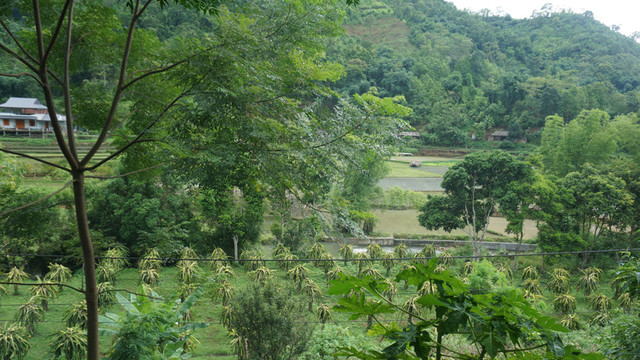Resilient prosperity in SIDS: forging a new finance compact
On the eve of a major international meeting in Cabo Verde to design a new 10-year plan for Small Island Developing States – and building on the 2022 Bridgetown Agenda for the reform of the global financial architecture – IIED researchers propose a new finance compact for resilient prosperity for island states.


A view of Roseau, the capital of Dominica, the day after Hurricane Maria struck, 2017 (Photo: Russell Watkins/DFID, via Flickr, CC BY 2.0)
Many of the world’s 57 Small Island Developing States (SIDS) and territories are caught in a downward economic and social spiral. They are saddled with significant and growing indebtedness, recently exacerbated by COVID-19 and climate-related disasters. Disasters can wipe out critical infrastructure and island economies within hours, and climate change is making some of these events more frequent and intense.
In these conditions, sustained economic and social development is challenging, and SIDS struggle to access affordable private investment – as often the scale is too small and the risks are too high for most investors. Constrained government revenues mean it becomes increasingly difficult to make debt repayments, protect public expenditure for basic services, and invest in the resilience and diversification measures so desperately needed to escape the negative spiral.
Now is the time for action
With SIDS having done least to cause the climate problem and their very existence now under threat due to loss and damage, there is an urgency and overwhelming moral imperative to break the downward spiral and create a more virtuous cycle.
In 2024, Antigua and Barbuda will host the 4th UN International Conference on SIDS, which will see the agreement of a new 10-year accord for forging resilient prosperity in SIDS. At the heart of the conference and accord, there will need to be a new financial compact supported by the international community.
Here, we set out proposals for what this needs to contain to create the virtuous cycle and offer a basis for more detailed analysis and development:
1. A fresh start – debt alleviation
Heavily indebted SIDS need a fiscal fresh start. The best option would be a wholesale write-off of SIDS debt stocks, with island governments using the money they save on repayments to invest in achieving the Sustainable Development Goals and resilience-building measures. This fresh start could be achieved through creditor action, such as debt buybacks or write-downs, to show solidarity with SIDS and acknowledge historical injustices.
If the level of political solidarity does not emerge for eliminating debt stocks, a second choice would be layering debt alleviation measures across SIDS, where the stocks are reduced through measures like debt-for-climate and nature swaps (as applied in the case of Cabo Verde) or debt reprofiling.
The downside with layering different debt alleviation measures is the transaction costs involved when SIDS have limited capacity, so a high-capacity global SIDS debt and investment support platform would be required to level the playing field on debt negotiations and bring in specialist legal and negotiating advice.
2. Preventing slipping back – protection against future disasters
SIDS face climate-related disasters that commonly see extremely high losses compared with GDP, especially in comparison to larger countries. Dominica lost 224% of its GDP to Hurricane Maria in 2017 as a more extreme example. Such losses require islands to take on more debt over several years to recover lost assets, so even with a complete debt write-off, SIDS could quickly become heavily indebted again without protection measures.
An innovative response would be a global SIDS protection instrument supported by insurers and richer countries, where pooling would protect any single island state from losing more than a certain level of wealth. Further work is required to explore this.
A new loss and damage fund or enhancements to existing anticipatory disaster risk finance measures could also help SIDS access additional grant resources for recovery, meaning that fiscal space is protected. This combined approach also eliminates the need for complex ‘pause’ clauses.
3. Forging resilience – strengthening resilience and adaptation measures
SIDS need quick, high quality and significant grant money to spend on strengthening their resilience and benefiting their populations. Many straightforward measures are possible – burying power lines, distributed renewable energy generation, rehabilitating natural protections and constructing more storm-resilient buildings, for example.
SIDS are often directed towards international climate funds for this finance, but there are severe challenges with accessing money, and research by the Overseas Development Institute highlights that only tiny amounts of climate finance have been distributed and spent in SIDS. A new approach is needed.
We support a single, significant, policy-based cash transfer to each island state for spending on resilience-building measures, with no complex bureaucratic processes. Many countries already have detailed plans, often aligned to National Adaptation Plans, Nationally Determined Contributions or the climate prosperity plans being developed by the V20 group of nations, which have national ownership. Injection of this type of funding gives SIDS a chance to achieve the step change in resilience they so desperately need.
A compelling case for action
This proposed new finance compact for SIDS resilient prosperity is simple and transformative:
- Restore debt sustainability
- Protect against future climate-related losses
- Mobilise quick, quality money for resilience measures, and
- Support SIDS with high-capacity legal and negotiating support.
In global terms, the costs of giving SIDS a chance at resilient prosperity are not high but require further calculations. Equally, the moral and justice case for the global community taking action is compelling, even beyond reaching for arguments around slavery reparations.
Further, the world desperately needs to put a tick in the win column, especially with the anger growing from poorer countries about how dramatically the cards are stacked against them.
Look out for more IIED research on debt restructuring and finance for SIDS in the next month.
With thanks to Laura Kelly and Ritu Bharadwaj for their contributions.



